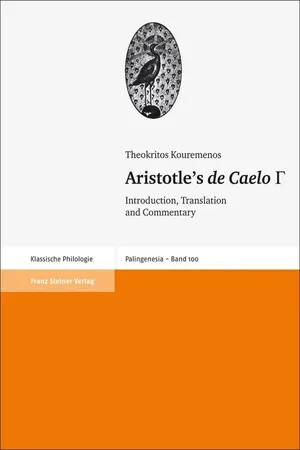
- 126 pages
- English
- PDF
- Available on iOS & Android
About this book
This is the first full-scale commentary on Aristotle's de Caelo III to appear in recent decades. de Caelo III can serve as a good introduction to Aristotle's physics and its character. In it he answers some very general questions about the elements of all material things except celestial objects: how many these elements are, why they cannot be infinitely many but must be more than one, whether they are eternal or can be generated and decay, and, if the second, how. His discussion is often framed as a critique of rival theories, and he argues systematically against the geometrical theory of the elements in Plato's Timaeus, which adds greatly to the interest of the work. The commentary adduces many parallel passages from Aristotle's other works to round off the readers understanding, and the introduction offers a brief but comprehensive overview of the Aristotelian theory of the elements, which de Caelo III often takes for granted.
Frequently asked questions
- Essential is ideal for learners and professionals who enjoy exploring a wide range of subjects. Access the Essential Library with 800,000+ trusted titles and best-sellers across business, personal growth, and the humanities. Includes unlimited reading time and Standard Read Aloud voice.
- Complete: Perfect for advanced learners and researchers needing full, unrestricted access. Unlock 1.4M+ books across hundreds of subjects, including academic and specialized titles. The Complete Plan also includes advanced features like Premium Read Aloud and Research Assistant.
Please note we cannot support devices running on iOS 13 and Android 7 or earlier. Learn more about using the app.
Information
Table of contents
- CONTENTS
- ACKNOWLEDGMENTS
- INTRODUCTION
- 1. ARISTOTLE’S COSMOS
- 2. THE FIRST SIMPLE BODY
- 3. THE EMPEDOCLEAN SIMPLE BODIES AND THEIR COMPOUNDS
- 4. CELESTIAL OBJECTS AND THE EMPEDOCLEAN SIMPLE BODIES
- 5. THE CONTENTS OF CAEL. Γ
- 6. THE PRESENT TRANSLATION AND COMMENTARY
- TRANSLATION
- COMMENTARY
- BIBLIOGRAPHY
- INDEX OF PASSAGES